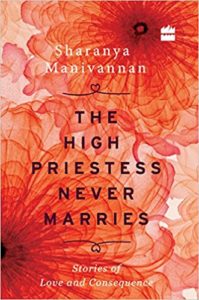Anna Lynn Tom on reading Sharanya Manivannan’s The High Priestess Never Marries.

Picture credits: Amazon India
Inhabiting these spaces, these women
Today, I’ll tell you about the book. Today, I’ll warn you about the stories. They’ll haunt you if you’re a woman. They’ll tear open your fierce love for freedom. They’ll leave you wanting. Yearning. To be them.
Because Sharanya Manivannan weaves little vines around her women. She creates vignettes of her characters so that they build a nest of spirited comfort around themselves. In her carefully composed collection of stories, her women are the Rasathis of their longing. Of their Love. Of their Consequence. Just as the cover page declares. And sometimes it (this Love, this Consequence) will get so intense that you’ll have to put the book down. And cook.
Yes. Cook. Put bitter gourd in spice. Let it simmer and sizzle into a fry. Then pour the sweetened jaggery syrup over the crispy brown bitterness. And feed them. Feed the men and the women you love. Like Manivannan does. Through her women.
Ammai gave this book to me. If she read the little bits I mull over to write here, she’ll tell me to go to confession. But there’s another part of her that I know. A part that we inhabit like the women in Manivannan’s stories. Some like Ammai choose to marry. Some, like me, hope not to.
Once, when I was a child, I wanted to marry my God. An awakening of some kind changed that wish into something more guilt-drenched, perhaps like Antara’s in “Afternoon Sex”. But even in those moments, “Ancestress” is not far away from my mind. In it, she will marry her goddess. And in my thought will be another wish. A guilt-drenched yearning for a goddess in the world I inhabit.

Picture credits: Anna
Sometimes I think it could be N. She is also a Manivannan woman. “In Guilt and the Gandhi Quartet”, an unnamed woman’s stomach stirs at the sight of a monkey with its tail a question mark in the air. The unnamed woman cries. She tells her gay friend that it reminds her of a gesture. Of Gorging On Grief. In that tiny moment, N is my unnamed woman.
There is a rhythm to our sadness. Like the Oppari singers in “Conchology”. There is a sadness to our togetherness. Like the woman who knows the sadness of foreknowledge in “Corvus”. There is a togetherness in our walking. Like Inanna and Lilitu of “The Huluppu Tree.”
But we are sole creatures even in love. We crave our aloneness and we will not empathize with pain in the people who try to make us their own. And then, at that time, our song of comfort will be the Earth – and her children. At that time, we will be “The High Priestess Who Never Marries.”
If you ask me who I am – Who I want to be, I will say Arundhati. I love every woman in her stories, but none like Arundhati. I love that she belongs to a small God. I love that she’s married to the pacifist husband. I love her two little girls who sleep in the bedroom with their parents. Because Arundhati and Shravan believe that a library is more important than privacy.
I love her most of all for stealing to the orchard – before her marriage – and weeping. Unleashing salty tears as she bit into the first mango of the orchard she planted. Arundhati will cry again as the “Cyclone Crossing” leaves a ravaged land of broken trees and broken old love. But she will nurse them back – like the mother she is.
When I go to meet my girls, I will tell S that I want a baby. We will be at Truffles as the wind blows our hair. We will hold our city the way Manivannan’s women hold their places. Sri Lanka. Chennai. Auroville. S will be going to Pondicherry the next day. She’ll smile at me and kiss my palm. She will say, Yes baby, we will. One day – after we’re 32 and still single. We will both be thinking of our pact.
When I give the book back to Ammai, I’ll think of what she said that day. I feel the emptiness in my womb. Asking me to fill. We were watching baby Neil gurgling and trying to crawl.
I know Ammai. I know. That’s how I felt when I read some of her stories. So much that I had to text Ma’am. I’m unable to read or to write. I’m hung over her words. What to do? I asked her. In the end, because of what Ma’am said, I finished the book. Ma’am saved me. Again and again and again.
But I will leave them. All of them. And Manivannan has taught me how to – by inhabiting her women. The women who love and leave and sometimes stay. But there’s more leaving than staying in her stories. And it comforts me. Doesn’t make me sad like it used to. For a long time, I used to define tragedy that way.
But you may ask me now, who I will choose. Who I really love. I will tell you that I love all of them. Even the Him who brought me my own copy of The High Priestess Never Marries.
And how can I forget Her? She who might be forced to leave and then stay. She who taught me to love the first words of a borrowed “Mother Tongue.” She because of whom I could decipher this – Nee Pondicherry-le irukira nerathila, Madras-ay kamathila vaadi poguthu (while you are in Pondicherry, all of Madras is wilting with desire.)
Anna Lynn Tom
Latest posts by Anna Lynn Tom (see all)
- In these Spaces, with these Women - 30th June 2017
- Kitchen Lessons - 16th December 2016





